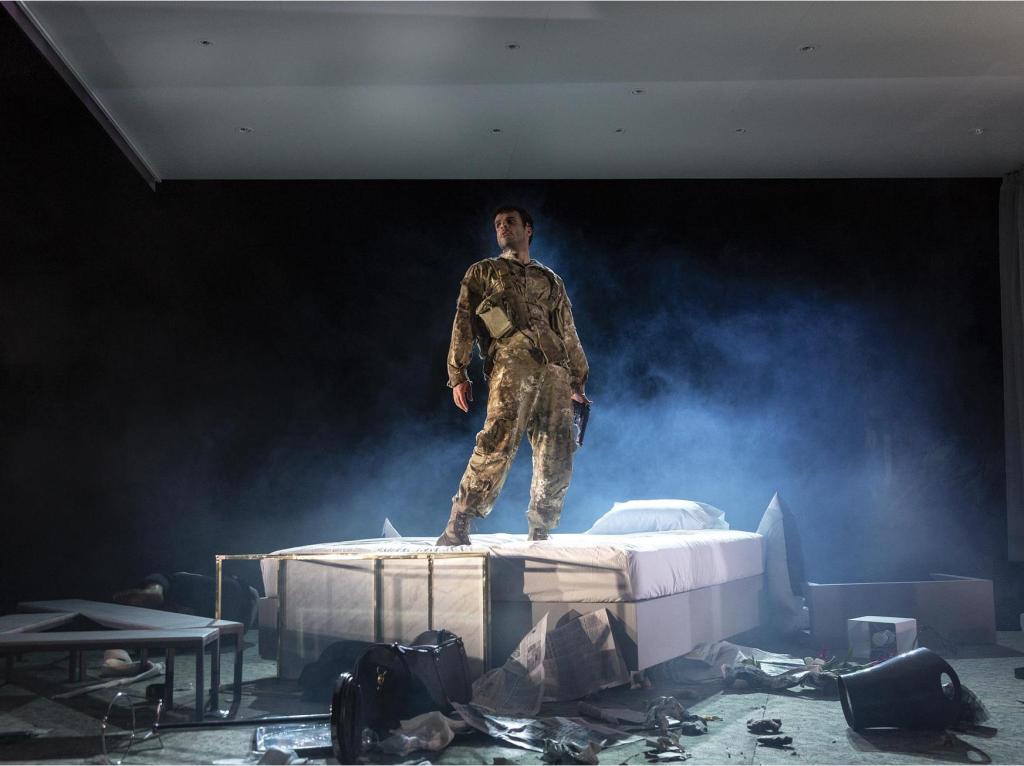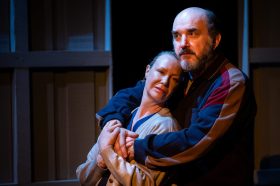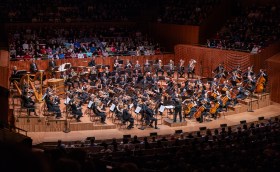Fayssal Bazzi in Blasted. Photo by Pia Johnson.
Upon entering the Merlyn Theatre for Malthouse’s new production of Blasted the audience is given a warning on a small placard about certain elements in the performance. Standard mentions of ‘smoke haze’ and ‘course language’ are there, but on closer inspection we are informed that the play will also include ‘extreme violence, sexual violence, nudity and content some audiences may find confronting.’ There is even a trigger warning in place. And rightly so it turns out as this devastating production of Sarah Kane’s controversial play will truly blow you away; figuratively and literally. It’s an earth-shaking and unescapably harrowing experience you will find hard to forget. It’s almost been a week since I saw Blasted and I’m still shook. You have been warned.
Blasted premiered at the Royal Court Theatre in London in 1995 and created outrage amongst audiences and critics alike. Sarah Kane committed suicide four years later at the age of twenty-eight after completing five plays throughout her short life. Since then Blasted has received a special Outstanding Achievement Olivier Award in 2011 and Kane’s work has been performed all over the world.
First things first; some people will definitely be offended by some of the content in this piece. Blasted contains shockingly racist and offensive language, brutal violence, sexual assault, an extremely graphic rape scene and cannibalism. But for those audiences brave enough to take this dark journey the rewards are plenty. Blasted is a smack in the face that will shake you and wake you up to the horror of insidious violence that permeates our everyday lives. Kane’s play goes to horrifying extremes, though never ridiculous or perfunctory, to show us our capacity for destruction on both an intimate and epic scale.
Ian (David Woods) and Cate (Eloise Mignon) spend a night in a spiffy hotel room in Leeds. He’s a middle-aged misogynistic, racist and homophobic journalist with an undefined possibly military background. She’s a young woman with a slight intellectual disability looking forward to a new job. It’s implied that they have been seeing each other on and off for a while. As the night progresses Ian’s need for sexual gratification is rebuffed by Cate and the next morning, as she showers in the other room and promptly escapes, a soldier (Fayssal Bazzi) bursts into the room and overpowers Ian before a bomb explodes destroying the hotel room. The characters then find themselves in the middle of a warzone. The soldier keeps Ian hostage and reminisces about his wartime atrocities before subjecting him to various forms of torture and rape. Cate re-enters with a small baby and tries to tend to a dying Ian. Needless to say it doesn’t end well for anyone.
Director Anne-Louise Sarks has reunited with her design team from last year’s phenomenal staging of The Testament of Mary, set and costume designer Marg Horwell and lighting designer Paul Jackson, and the result is beyond brilliant. This production looks incredible and features one of the most impressive set changes I’ve ever seen. No spoilers but suffice to say the audience are well and truly hurled into the destructive warzone featured later in the play and the stagecraft employed to achieve this is mindbogglingly good. Sarks and Jackson effectively employ the use of quick snap blackouts, also seen in Mary, during a harrowing sequence showing Ian’s progressive physical and psychological degradation. It’s hard to watch, but incredibly powerful. The only design element that is less successful are the beautifully composed but superfluous videos projected above the stage.
This cast is bold and brave. Mignon makes Cate initially playful and cheeky before becoming numb and shell-shocked later in the piece. Bazzi is a hulking presence on stage and he instils his character with a chilling stoicism. Whenever Bazzi’s soldier appears the danger is palpable. Woods’ Ian is truly despicable at the start of the show swaggering around the hotel room, drinking wildly and treating Cate abominably; he really makes you hate him. As the play progresses and Ian is brutally broken Wood’s performance becomes mesmerising as he fully commits to the tragedy of the piece. This is a very tough play that asks a lot of the performers, but Sarks and her cast rise to the challenges and controversy impeccably. If you see them at the bar after the show (and, trust me, you’ll need a stiff drink) maybe ask if they want a hug.
So why sit through all this misery and violence? Because Blasted forces you to witness what goes on every day in all corners of the world but most of us don’t like to see. It explores violence and debasement on both a domestic and global scale. It’s a primal scream from the depths of hell in the face of our complacency. This is confronting theatre of the highest order and Malthouse Theatre are to be applauded for having the balls to unleash Blasted upon us. We need this now.
4 ½ stars ★★★★☆
Blasted
By Sarah Kane
Presented by Malthouse Theatre
Directed by Anne-Louise Sarks
Featuring Fayssal Bazzi, Eloise Mignon and David Woods
24 August – 16 September 2018
Merlyn Theatre, Malthouse





